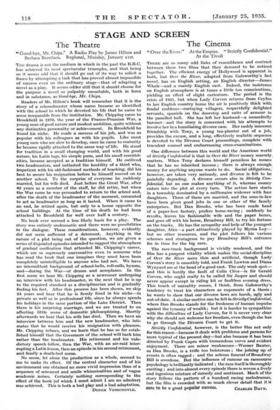The Cinema
" Over the River." At the Empire. " Strictly Confidential." At the Tivoli THERE are so many odd links of resemblance and contrast between these two films that they demand to be noticed together. The efficient energy of Hollywood is apparent in both, but Over the River, adapted from Galsworthy's last novel, has an English setting, an English director—James Whale—and a mainly English cast. Indeed, the insistence on English atmosphere is at times a little too conscientious, yielding an effect of slight caricature. The period is the crisis of 1931, but when Lady Corven returns from Ceylon to her English country home the air is positively thick with feudal emblems—curtsying villagers, respectfully delighted servants, spaniels on the doorstep and suits of armour in the panelled hall. She has left her husband—a scoundrelly baronet—and the story is concerned with his attempts to involve her in a humiliating divorce case. Her rashly innocent friendship with Tony, a young tea-planter out of a job, provides the excuse, and a long, effectively realistic sequence is devoted to the Divorce Court proceedings, complete with truculent counsel and embarrassing cross-examinations.
One difference between this world and the American world of Strictly Confidential is that in Over the River money scarcely matters. When Tony declares himself penniless he means that he has no inherited income ; there is always enough money for anything anyone wants to do. Social obligations,' however, are taken very seriously, and divorce is felt to be painfully degrading. A divorce occurs also in Strictly Con- fidential, but no one makes anything of it, whereas money enters into the plot at every turn. The action here starts in a township dominated by a millionaire widower with four daughters. Three of them are married, and the sons-in-law have been given good jobs in one or other of the family enterprises. But Dan Brooks, who has been made head of a paper-box factory, prefers horse-racing ; suddenly he revolts, leaves his fashionable wife and the paper boxes, and goes off with his horse, Broadway Bill, to try his fortune on the tracks. He has the sympathy and help of the youngest daughter, Alice—a part attractively played by Myrna Loy— but no other resources, and the plot follows his various schemes and stratagems to pay Broadway Bill's entrance fee in time for the big race.
The race-track background is vividly rendered, and the film has a pungent vitality which makes the social discipline of Over the River seem thin and artificial, though Lady Corven's story is smoothly told, and Frank Lawton and Diana Wynyard are at the head of a good cast. The only weak spot— and this is hardly the fault of Colin Clive—is Sir Gerald Corven, who ought really to be called Sir Jasper and should never appear except in riding kit or faultless evening dress. This touch of unreality comes, I think, from Galsworthy's tendency to treat his characters as exponents of a thesis ; he wants to show that our divorce laws are harsh, ugly and out-of-date. A similar motive can be felt in Strictly Confidential, where Dan Brooks stands for the freshness of human impulse against the tyranny of wealth ; but it is harder to sympathize with the difficulties of Lady Corven, for it is never very clear why she should not welcome her freedom, even though she has to go through the Divorce Court to get it.
Strictly Confidential, however, is the better film not only for this reason—because it deals with problems and persons far more typical of the present day—but also because it has been directed by Frank Capra with tremendous verve and evident enjoyment. There are minor weaknesses—Warner Baxter, as Dan Brooks, is a trifle too boisterous ; the joining up of events is often ragged ; and the solemn funeral of Broadway Bill is overdone. But the influence of rumour on racecourse psychology is brilliantly indicated ; the race itself is thoroughly exciting ; and into almost every episode there is woven a lively and ingenious mixture of comedy and sentiment. Much of the story follows the pattern of a hundred racing melodramas, but the film is crowded with so much clever detail that it is sure to be a great popular success. CHARLES DAVY.














































 Previous page
Previous page